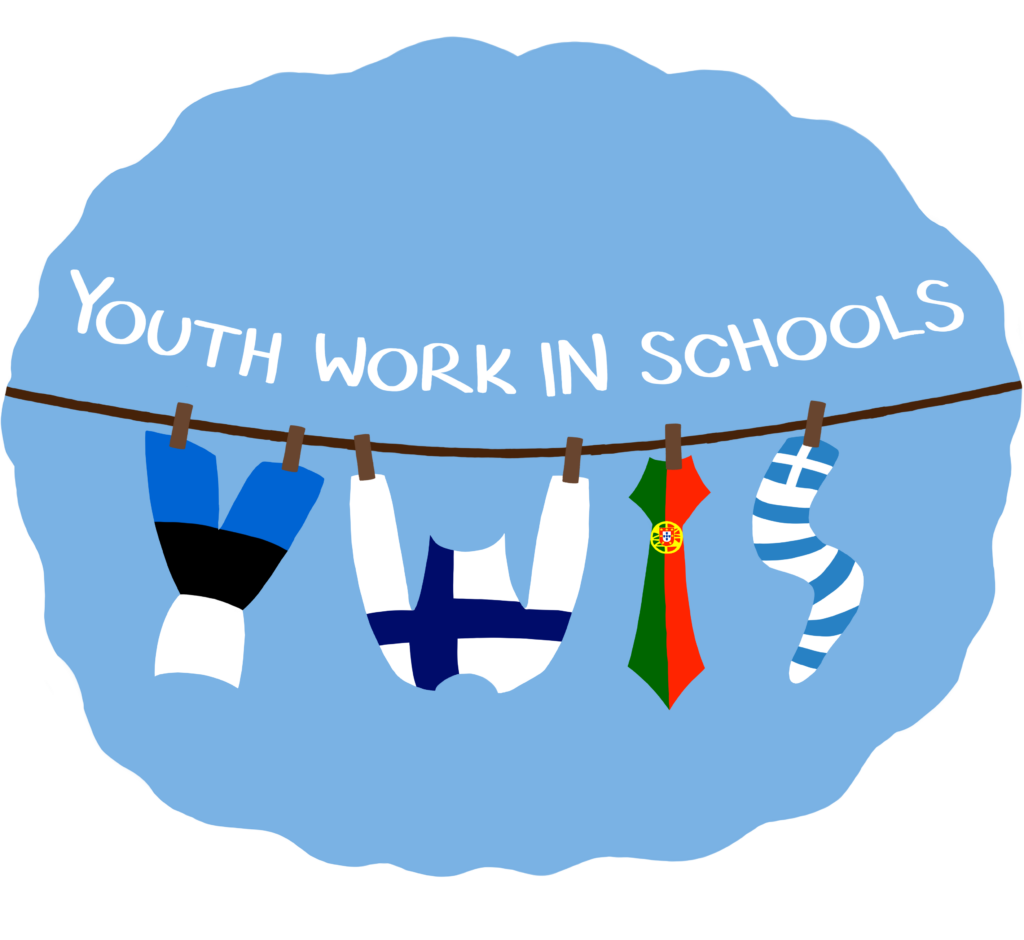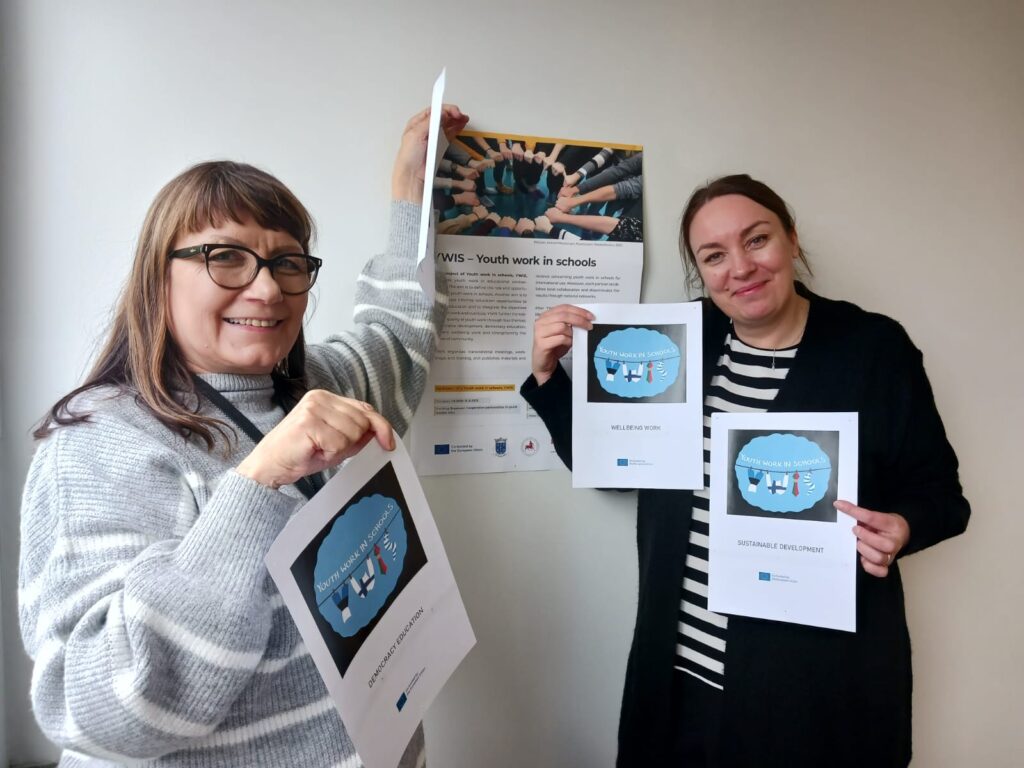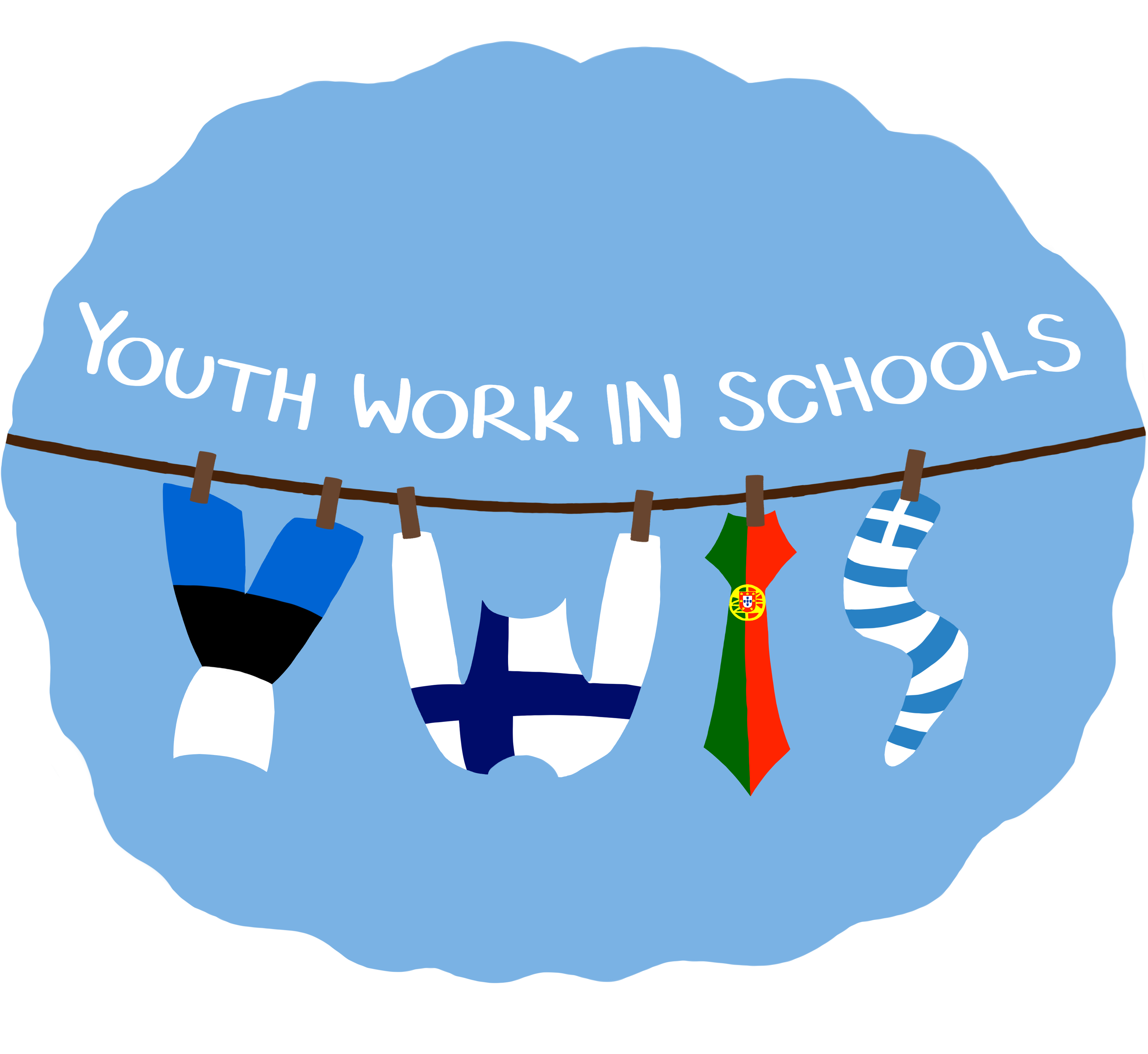The project of Youth work in schools, YWIS, develops youth work in educational environments. The aim is to define the role and opportunities of youth work in schools. Another aim is to incorporate informal education opportunities to formal education and to integrate the objectives of youth work and curricula. YWIS further increases the quality of youth work through four themes: sustainable development, democracy education, student wellbeing work and strengthening the
sense of community.
YWIS organises transnational meetings, workshops and training, and publishes materials and reviews
concerning youth work in schools for international use. Moreover, each partner establishes local collaboration and disseminates the results through national networks.
After YWIS youth work in schools is better identified in partner organisations and regions. Cooperation between schools and youth work organisations is established to facilitate and develop young people’s informal education. Youth work is better integrated into school curricula and practices. Youth workers’ competence has strengthened and new contents have been introduced to carry out youth work in schools.
Project name: Youth work in schools, YWIS
Duration: 1.9.2022 – 31.8.2025
Funding: Erasmus+ Cooperation partnerships in youth KA220-YOU
Lead partner: South-Eastern Finland University of Applied Sciences Xamk. Partners: Freguesia de Vila Boa do Bispo (Portugal), University of Thessaly (Greece) and Saaremaa Noorsootöö Keskus (Estonia). Other partners: Municipality of Mikkeli.
More info: xamk.fi/youthworkinschools
Come along with us

@ywis2022
School-based youth work is becoming international
Objectives
The project of Youth work in schools, YWIS, develops youth work in educational environments. The aim is to define the role and opportunities of youth work in schools. Another aim is to incorporate informal education opportunities to formal education and to integrate the objectives of youth work and curricula. YWIS further increases the quality of youth work through four themes: sustainable development, democracy education, student wellbeing work and strengthening the sense of community.
Implementation
YWIS consists of four work packages: Project management, Best practices of local networks, Mixing and testing best practices and Arranging learning and teaching activities. YWIS organises transnational meetings, workshops and training, and publishes materials and reviews concerning youth work in schools for international use. Moreover, each partner establishes local collaboration and disseminates the results through national networks.
Results
After YWIS youth work in schools is better identified in partner organisations and regions. Cooperation between schools and youth work organisations is established to facilitate and develop young people’s informal education. Youth work is better integrated into school curricula and practices. Youth workers’ competence has strengthened and new contents have been introduced to carry out youth work in schools.
More information about Erasmus+ programs: https://erasmus-plus.ec.europa.eu/
The European Commission is not responsible for the content of this publication.
YWIS BOOK
European Perspectives and Good Practices on
Youth Work in Schools and Educational Institutions
Inspiration and Approaches for Youth Workers


E-LEARNING PLATFORM
This site hosts the e-learning platform for the “Youth Work in Schools (YWIS)” project, offering a selection of themed courses such as non-formal learning, democratic education, community-building and sustainable development in school settings.
On this platform users can access articles, research materials, video presentations, self-tests and practical exercises aimed at strengthening youth-work competences in educational environments.
The courses are designed for use by youth workers, teachers and school staff to support the integration of informal-learning practices into formal curricula.
LINK TO THE E-LEARNING PLATFORM
LATEST NEWS
- Get acquainted – Be genuinely present – ListenLiise KukkLümanda Põhikool Since last spring I ́ve tried out a few of the activities explained in the handbook “EuropeanPerspectives and Good Practices on Youth Work in Schools and Educational Institutions.Inspiration and Approaches for Youth Workers”, but there ́s one that really had a bigger impacton my everyday work. It is called “Get acquainted – Be genuinely present – Listen“ and is underthe category “Strengthening the sense of community”.
- School Youth Work in Kuressaare Nooruse SchoolSHORT SUMMARY: A Youth worker from Kuressaare Nooruse School opens up about herthoughts on school youth work. She is working in the biggest school of Saaremaa island. Asof September 2021, Kuressaare Youth School has 758 students and 70 teaching staff. Shetalks about the school’s youth work through her thoughts and beliefs. She explains whyworking with young people is important to her and what young people gain from it.I work as a youth worker at Kuressaare Nooruse School. It is important for me to be able towork with a wide range of young people and focus on non-formal education. When weorganise… Read more: School Youth Work in Kuressaare Nooruse School
- School Youth Work in SaaremaaSHORT SUMMARY: Chief Specialist in Youth Work and Hobby Education in Municipality of Saaremaa gave her opinion about the youth school work in Saaremaa. She highlights all important aspects of school youth work and she gives an overview of what she thinks makes school youth work special in Saaremaa.Involving young people in school life has a positive effect on the development of youngpeople, the acquisition of various skills, supports young people’s initiative and enables themto realize their ideas. In the schools of the Saaremaa municipality, there are the school’s youthworkers, whose role is to form a meaningful action plan from… Read more: School Youth Work in Saaremaa
- Student council elections at schoolSHORT SUMMARY: Youth Worker in Kuressaare Educational School has tried out oneactivity explained in the handbook “European Perspectives and Good Practices on YouthWork in Schools and Educational Institutions. Inspiration and Approaches for YouthWorkers”. He has made a blog text about the where he talks about all the steps he madeduring this practice experiment. He gives an overview of the effects and changes that testingthis practice had on young people. Also what kind of difficulties he had turining testing thispractic. He is opening his thoughts about the importance of a youth worker in school.Our school participates in Erasmus+ project “Youth work… Read more: Student council elections at school
- New Scientific Article Published: Youth Work in Schools as a Pathway to Sustainability, Well-Being, and Democratic CommunitiesThe YWIS project is pleased to announce the publication of the article “Youth Work in Schools: Pathways to Sustainability, Well-Being and Democratic Communities” by Stelios Pantazidis and Yannis Pechtelidis from the University of Thessaly, Greece. The article appears in the open-access journal Youth (MDPI) and has already attracted significant attention, with over 1,000 views. The study investigates how youth work can be meaningfully integrated into school environments as a response to contemporary educational challenges. Drawing on best practices from Greece, Finland, Estonia, and Portugal within the framework of the Erasmus+ Youth Work in Schools (YWIS) project, it explores how youth… Read more: New Scientific Article Published: Youth Work in Schools as a Pathway to Sustainability, Well-Being, and Democratic Communities
CHECK MORE NEWS FROM THE BLOG SECTION
YWIS project coordinating organization JUVENIA Youth Research and Development center had their 15th anniversary on 10.10.2023.
Marita and Veronica from Juvenia had info about YWIS-project themes for the participants and were looking for cooperation for the future piloting activities.

